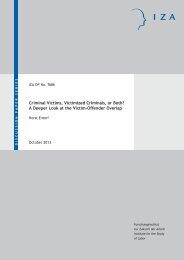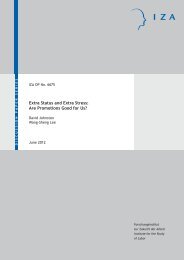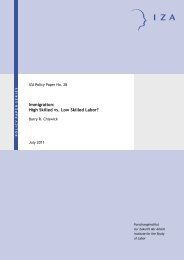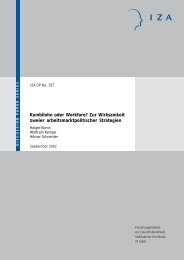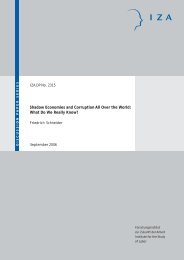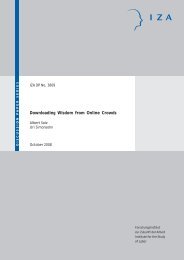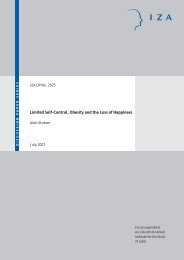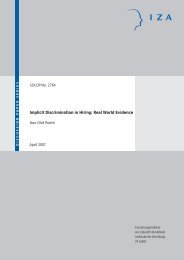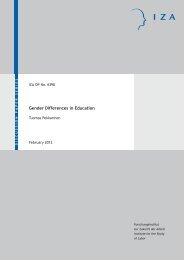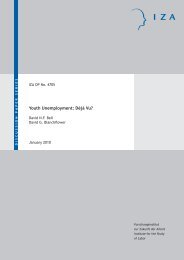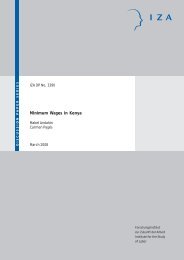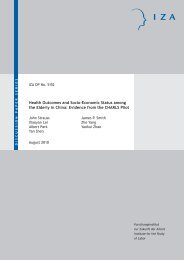The Great Recession of 2008-2009: Causes ... - Index of - IZA
The Great Recession of 2008-2009: Causes ... - Index of - IZA
The Great Recession of 2008-2009: Causes ... - Index of - IZA
- TAGS
- recession
- index
- ftp.iza.org
Create successful ePaper yourself
Turn your PDF publications into a flip-book with our unique Google optimized e-Paper software.
However, despite these interventions, the global financial crisis quickly evolved into a global<br />
jobs crisis, as the crisis-induced credit crunch strangled the real economy and trade flows<br />
collapsed. Unemployment in OECD countries has surged, while in countries without social<br />
security schemes, the downturn has threatened to push millions into poverty.<br />
Many – but by no means all – developing and emerging economies felt the deleterious effects<br />
<strong>of</strong> the US recession by the end <strong>of</strong> <strong>2008</strong>. <strong>The</strong> typical outcome was a growth deceleration<br />
(ranging from mild to major) in many parts <strong>of</strong> the developing world, but there were cases <strong>of</strong><br />
outright recessions too. Hard-hit countries include Armenia, Mexico, South Africa, Turkey,<br />
the Baltic States, and Ukraine. At the same time, the two most successful globalizers <strong>of</strong><br />
recent times have avoided a major downturn, which has been crucial for kick-starting the<br />
recovery in <strong>2009</strong>. China has, in particular, managed to keep their economy growing in <strong>2009</strong><br />
at a rate <strong>of</strong> 8.7 per cent, which was supported by the massive stimulus package put together<br />
by the Chinese authorities (amounting to US$585 billion). With a smaller stimulus, the Indian<br />
economy has also proven to be resilient thanks to strong domestic demand, with growth only<br />
falling to 6.7 per cent in <strong>2009</strong>.<br />
Nonetheless, the world economy enters 2010 in an environment fraught with considerable<br />
degree <strong>of</strong> uncertainty. While the worst seems to be over, and while one hears proclamations<br />
<strong>of</strong> a robust recovery, the jury is still out on the lessons and legacies <strong>of</strong> the tumultuous<br />
economic events <strong>of</strong> <strong>2008</strong> and <strong>2009</strong>. How apposite is the epithet <strong>of</strong> the ‘<strong>Great</strong> <strong>Recession</strong>’?<br />
What were the historical and global circumstances that led to its seemingly sudden<br />
emergence? To what extent were policy errors by past US administrations responsible for the<br />
crisis? How have policymakers across the world responded to such economic volatility? How<br />
effective have these responses been? What is the way forward in a post-crisis world? <strong>The</strong>se<br />
are the questions that are probed in this paper. In raising these questions and seeking to<br />
respond to them, the paper does not intend to <strong>of</strong>fer a blueprint for a post-crisis world, nor<br />
does it aim to <strong>of</strong>fer policy prescriptions that seek to uphold the institutional agenda <strong>of</strong> any<br />
particular international organization or national government.<br />
This paper provides both an historical perspective on the period leading up to the crisis and<br />
insights into the events surrounding the crisis <strong>of</strong> 2007. This task is undertaken in section 2,<br />
which discusses the notions <strong>of</strong> the ‘Lost Decades’ and the ‘<strong>Great</strong> Moderation’, and the<br />
5



